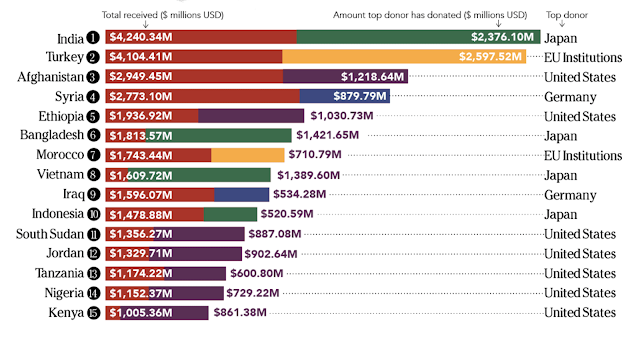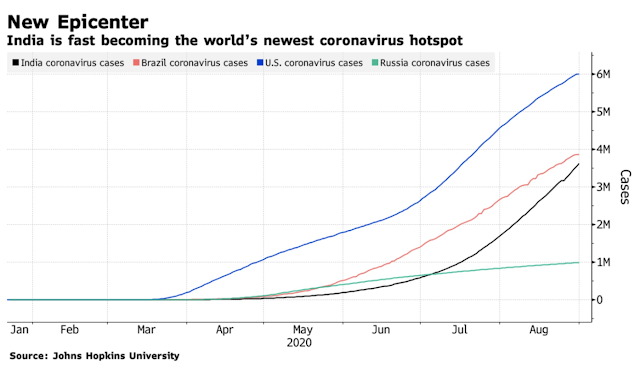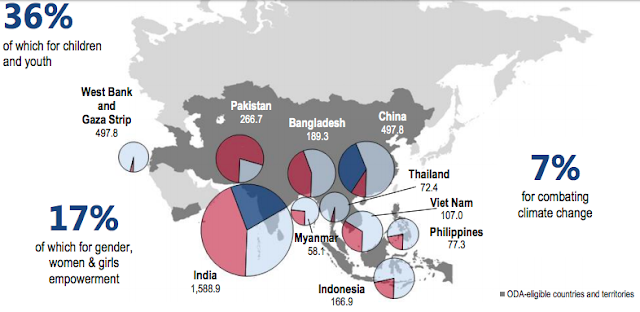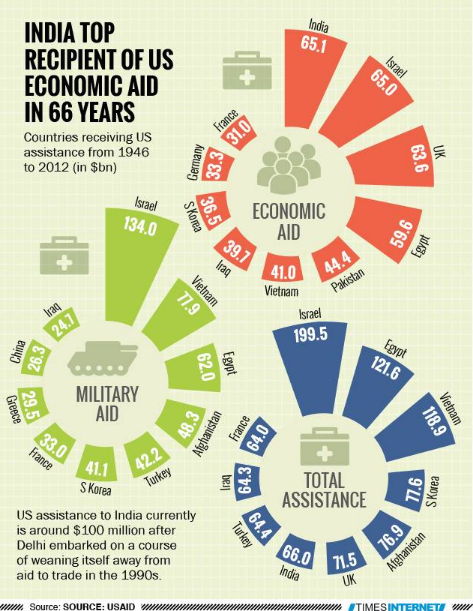PakAlumni Worldwide: The Global Social Network
The Global Social Network
Have Modi's Misguided Policies Turned India Into A Beggar Nation?
India is set to receive nearly $500 million in emergency aid from Japan to cope with rising covid19 cases and worsening economy, according to Hindustan Times. This is the largest amount of financial assistance announced by any country so far to support India’s response to the Covid-19 crisis, which has had widespread impacts on the Indian economy and health sector. India’s economy in the organized sector shrank nearly 24% last quarter. It is likely a 40% decline in GDP after the government takes the unorganized sector into account, according to the New York Times. Meanwhile, India is seeing record new daily coronavirus cases and becoming the new epicenter of the covid19 pandemic. Have Indian Prime Minister's misguided policies turned India into a beggar nation? The fact is that India was already the world's biggest recipient of foreign aid even before the pandemic. Pakistan is not even among the top 15 recipients of foreign aid.
India in Crisis:
Many in the world, including India's biggest cheerleader Fareed Zakaria, are beginning to see the stark reality of Modi's India as a big failure on multiple fronts. Indian state has failed to contain the deadly COVID19 pandemic. India’s economy in the organized sector shrank nearly 24% last quarter. It is likely a 40% decline in GDP after the government takes the unorganized sector into account, according to the New York Times. Meanwhile, India is seeing record new daily coronavirus cases and becoming the new epicenter of the covid19 pandemic. The country's democracy is in decline. India seems like a roadkill for China. This turn of events has created serious problems for Pakistani "liberals" who have long seen and often cited India as a successful example of "secular democracy" at work in South Asia.
Top Aid Recipients and Their Donors in 2017. Source: Wristband Reso... |
India World's Top Aid Recipient:
The Japanese emergency aid of $500 million to India is only the latest instance of multi-billion dollar aid Tokyo has provided to New Delhi in recent years. In fact, India is currently the world's largest recipient of official development assistance (ODA) and Japan is its biggest donor. India's $4.21 billion in assistance is followed by Turkey $4.10 billion, Afghanistan $2.95 billion, Syria $2.77 billion, Ethiopia: $1.94 billion, Bangladesh $1.81 billion, Morocco $1.74 billion, Vietnam $1.61 billion, Iraq $1.60 billion and Indonesia $1.48 billion. Pakistan is not even among the top 15 recipients of foreign aid.
India: Epicenter of COVID19:
India is rapidly becoming the world’s new coronavirus epicenter, setting a record for the biggest single-day rise in cases as experts predict that it’ll soon pass Brazil -- and ultimately the U.S. -- as the worst outbreak globally, according to Bloomberg. Over 78,000 new cases were added in a single day taking the total tally to over 3.6 million. This represented the highest ever one-day surge among all major countries. At the current growth rate, India’s virus cases will eclipse Brazil’s in about a week, and the U.S. in about two months. And unlike the U.S. and Brazil, India’s case growth is still accelerating seven months after the reporting of its first coronavirus case on Jan. 30. The pathogen has only just penetrated the vast rural areas where the bulk of its 1.3 billion population lives, after racing through its dense mega-cities.
Private International Charity to India:
India tops the list of charity recipients from private foundations while Pakistan is ranked as the 12th largest recipient of philanthropic giving in the world, according to a report released by OECD (Organization for Economic Co-operation and Development).
Global Philanthropic Foundations:
Philanthropic contributions of major international private foundations in Pakistan totaled $267 million out of the $42 billion global contribution in 2013-2015. This compares with $1.6 billion in top-ranked India and $498 billion in second-ranked China. US-based Bill and Melinda Gates Foundation (BMGF) contributed nearly half of the $42 billion in global charity by private foundations.
Private foundations are filling the huge gaps in public funding of health and education sectors in developing nations. . They contributed $11 billion for the health sector alone in the three year period, ranking third behind the United States and a global fund for fighting disease.
Massive Western Aid to India:
In addition to being the biggest recipient of private foreign charity, India has been the number one recipient of official US aid since 1947, according to the US government data. The country India's first Prime Minister turned to for help during the 1962 China-India war was also the United States.
India has received $65.1 billion in US aid since its independence, making it the top recipient of American economic assistance. Pakistan, with its $44.4 billion, is at number 5 on the list. US data also shows that Pakistan is not among top 10 for military or total economic and military aid.
Local Charity in Pakistan:
Pakistanis donate generously to local charities in the country in the form of religiously mandated donations such as "zakat, sadaqa and fitrana". One of the key measures of empathy is generosity to others, the kind of generosity demonstrated in Pakistan by the likes of late Abul Sattar Edhi. The Edhi Foundation set up by the great man is funded mainly by small donations from ordinary people in Pakistan.
Anatol Lieven, author of "Pakistan: A Hard Country" wrote the following tribute to the Mr. Edhi:
"There is no sight in Pakistan more moving than to visit some dusty, impoverished small town in an arid wasteland, apparently abandoned by God and all sensible men and certainly abandoned by the Pakistani state and its elected representatives - and to see the flag of Edhi Foundation flying over a concrete shack with a telephone, and the only ambulance in town standing in front. Here, if anywhere in Pakistan, lies the truth of human religion and human morality."
What Professor Anatol Lieven describes as "human religion and human morality" is the very essence of the Huqooq-ul-Ibad (Human Rights) in Islam. Abdus Sattar Edhi understood it well when he said, "there's no religion higher than humanity".
Edhi understood the meaning of what the Quran, the Muslim holy book, says in chapter 2 verse 177:
"Righteousness is not that ye turn your faces towards the east or the west, but righteous is, one who believes in God, and the last day, and the angels, and the Book, and the prophets, and who gives wealth for His love to kindred, and orphans, and the poor, and the son of the road, beggars, and those in captivity; and who is steadfast in prayers, and gives alms."
A recent article written by Shazia M. Amjad and Muhammad Ali and published in Stanford Social Innovation Review said that "Pakistan is a generous country. It contributes more than one percent of its GDP to charity, which pushes it into the ranks of far wealthier countries like the United Kingdom (1.3 percent GDP to charity) and Canada (1.2 percent of GDP), and around twice what India gives relative to GDP."
OECD says corporate donations in Pakistan have increased from $4.5 million to $56.4 million over the last 15 years. Corporate donations are dwarfed by individual donations made as zakat, sadaqa and fitrana as commanded by the Quran.
In addition to zakat, sadaqa and fitrana, Pakistanis spent about $3.5 billion on Eid ul Azha in 2017, according to analysts. This included sacrifice of $2.8 billion worth of livestock and another $700 million on clothes, shoes, jewelry and various services. This amount represent a huge transfer of wealth from urban to rural population, including many rural poor, in the country. It also brings philanthropic donations of Rs. 2.5 billion to Rs. 3 billion ($25-30 million) worth of animal hides which are sold to the nation's leather industry.
Empathy Study:
A Michigan State University (MSU) study of 63 countries finds that Pakistanis have higher empathy for others than people in their neighboring countries. It also finds that the United States is among the most empathetic nations in the world.
The MSU researchers, led by William J. Chopik, analyzed the data from an online survey on empathy completed by more than 104,000 people from around the world.
The survey measured people’s compassion for others and their tendency to imagine others’ point of view. Countries with small sample sizes were excluded (including most nations in Africa). All told, 63 countries were ranked in the study, according to MSUToday, a publication of Michigan State University.
Summary:
India's biggest cheerleaders, including Fareed Zakaria, are beginning to see the stark reality of Modi's India as a big failure on multiple fronts. India is set to receive nearly $500 million in emergency aid from Japan to cope with rising covid19 cases and worsening economy, according to Hindustan Times. This Japanese emergency aid of $500 million to India is only the latest instance of multi-billion dollar aid Tokyo has provided to New Delhi in recent years. In fact, India is currently the world's largest recipient of official development assistance (ODA) and Japan is its biggest donor. India was already the world's biggest recipient of foreign aid even before the pandemic. Pakistan is not even among the top 15 recipients of foreign aid. This $500 million is the largest amount of financial assistance announced by any country so far to support India’s response to the Covid-19 crisis, which has had widespread impacts on the economy and health sector. India’s economy in the organized sector shrank nearly 24% last quarter. It is likely a 40% decline in GDP after the government takes the unorganized sector into account, according to the New York Times. Meanwhile, India is seeing record new daily coronavirus cases and becoming the new epicenter of the covid19 pandemic. Have Indian Prime Minister's misguided policies turned India into a beggar nation?
Related Links:
Is Fareed Zakaria Souring on India?
Pakistan Success Against COVID19
Study Says Pakistanis Have Higher Empathy Than Neighbors
Comparing Median Wealth and Income in India and Pakistan
-
Comment by Riaz Haq on October 18, 2020 at 6:20pm
-
The Next #China? #India Must First Beat #Bangladesh. India’s #COVID19 #economic gloom turned into despair this week, on news that its per capita gross domestic product (#GDP) may be lower for 2020 than in neighboring Bangladesh https://www.washingtonpost.com/business/the-next-china-india-must-f...
https://twitter.com/haqsmusings/status/1317991276583636993?s=20
Ever since it began opening up the economy in the 1990s, India’s dream has been to emulate China’s rapid expansion. After three decades of persevering with that campaign, slipping behind Bangladesh hurts its global image. The West wants a meaningful counterweight to China, but that partnership will be predicated on India not getting stuck in a lower-middle-income trap.
------------
Consider first the exceptionalism of India’s growth. Bangladesh is doing well because it’s following the path of previous Asian tigers. Its slice of low-skilled goods exports is in line with its share of poor-country working-age population. Vietnam is punching slightly above its weight. But basically, both are taking a leaf out of China’s playbook. The People’s Republic held on to high GDP growth for decades by carving out for itself a far bigger dominance of low-skilled goods manufacturing than warranted by the size of its labor pool.
India, however, has gone the other way, choosing not to produce the things that could have absorbed its working-age population of 1 billion into factory jobs. “India’s missing production in the key low-skill textiles and clothing sector amounts to $140 billion, which is about 5% of India’s GDP,” the authors say.
If half of India’s computer software exports in 2019 ceased to exist, there would be a furor. But that $60 billion loss would have been the same as the foregone exports annually from low-skill production. It’s real, and yet nobody wants to talk about it. Policymakers don’t want to acknowledge that the shoes and apparel factories that were never born — or were forced to close down — could also have earned dollars and created mass employment. They would have provided a pathway for permanent rural-to-urban migration in a way that jobs that require higher levels of education and training never can. Bangladesh has two out of five women of working age in the labor force, double India’s 21% participation rate.
-
Comment by Riaz Haq on December 5, 2020 at 7:50am
-
#India's #economy is shrinking, and tens of millions of Indians have lost jobs or sunk into poverty. But #Modi's friend Gautam Adani’s personal wealth has more than doubled to $32b. Mukesh Ambani’s fortune has grown 25% to $75b. #Inequality #COVID19 #BJP https://www.economist.com/asia/2020/12/05/indias-super-rich-are-get...
https://twitter.com/haqsmusings/status/1335247896480923648?s=20
Some of India’s tycoons have prospered because they have learned not just to weather unpredictability, but to game the system. That system, alas, is failing India’s poor. Measures of malnutrition and stunting reveal an alarming backward slide over the past year. The unemployment rate shows some recovery from the worst of the covid shock, but that fails to capture the astonishing bleakness of India’s labour market. Before covid hit, barely 40% of adults were in paid work, according to the Centre for Monitoring the Indian Economy, a research firm. Now only 36% are. The rest, including legions of housewives, see no point in even looking for a job.
--------------
Some people have almost all the luck. Over the past year, as India’s economy has shrunk by around a tenth and tens of millions of Indians have lost jobs or sunk into poverty, the fortunes of the country’s two richest people have swollen. Gautam Adani, whose conglomerate sprawls from ports to coal mines to food, has seen his personal wealth more than double, to some $32bn. Mukesh Ambani’s riches, which derive from oil refining, telecoms and retail, among other things, have grown by just 25%, albeit to an intimidating $75bn or so.
The share of wealth and income going to the top 1% has been rising rapidly in recent years in India, as it has been in many countries. Last year they hoovered up 21.4% of earnings, just ahead of their counterparts in Russia, according to the World Inequality Database. Credit Suisse, a bank, puts their share of India’s wealth at 39%, well ahead of the richest 1% of Americans or Chinese. Most alarmingly, in India some of the rich have become super-rich by using their heft to crush smaller competitors and thus corner multiple chunks of the economy. The tilt in fortunes has rewarded not so much technical innovation or productivity growth or the opening of new markets as the wielding of political influence and privileged access to capital to capture and protect existing markets.
Merely a decade ago, according to data compiled by Marcellus, an investment-advice firm, among listed firms in India the 20 most profitable generated less than a third of profits. They now account for 70%. A study by Krishna Kant, a journalist, reveals that between 2014 and 2018 competition within ten different industries, from aviation to tyres, deteriorated markedly.
Across Indian markets, only the shares of giant firms have gained consistently over the past decade, says Rohit Chandra of iit Delhi, a university. International investors have noticed, and now bet increasingly not on promising new firms but on big old ones, which they expect to get even bigger. The government boasts that the five months from April to August saw a record $36bn in foreign investment, suggesting that its wise policies have sustained confidence during the covid-19 epidemic. What it trumpets less loudly is that more than half of that money, including hefty investments from Facebook and Google, poured into Mr Ambani’s hands alone.
-
Comment by Riaz Haq on May 5, 2021 at 7:49pm
-
#Aid pours into #India from around the world as #Covid cases soar. Flights from #UK, #US, #EU, #Taiwan and #Uzbekistan have delivered hundreds of tonnes of supplies, with more expected in the coming days from Israel and elsewhere. #Modi
https://www.ft.com/content/3da16e0d-bc3e-4e8e-a4b3-fa88427f2f7a via @financialtimes
India had in the recent past refused to accept international relief, which it felt was not in keeping with its own self-image as an emerging global power.
-------------
Emergency medical aid is pouring into pandemic-stricken India from around the world as the government seeks to fend off criticism about the slow pace of dispatching supplies to hospitals and states in desperate need.
Dedicated relief flights from countries including the UK, the US, EU member states, Taiwan and Uzbekistan have delivered hundreds of tonnes of supplies, with more expected in the coming days from Israel and elsewhere.
The inflow of oxygen generators, concentrators and cylinders, as well as life-saving drugs and other medical equipment marks the first time India has accepted large-scale international humanitarian aid since the 2004 Boxing Day tsunami, reflecting the magnitude of the crisis.
In a statement on Tuesday, the central government said the authorities were working “24 x 7 to fast track and clear the goods on arrival”.
-
Comment by Riaz Haq on March 13, 2023 at 5:27pm
-
#UK #aid to #India does little for #humanrights and #democracy, watchdog finds. Aid Program spent £2.7bn between 2016 and 2021 but is fragmented and lacks a clear rationale. There's no programming related to democratic space, free media or human rights https://www.theguardian.com/global-development/2023/mar/14/uk-aid-i...
Britain’s aid programme to India is fragmented, lacks a clear rationale and does little to counter the negative trends in human rights and democracy in the country, the government’s aid watchdog has found.
The findings are likely to be used by those who claim the UK government risks using its aid programme to deepen its relationship with India, including seeking free trade deals, rather than attempting to reduce poverty, which is the statutory purpose of UK aid.
The review by the Independent Commission for Aid Impact said the government spent £2.7bn on aid to India between 2016 and 2021, including the provision of loans by the government-run British International Investment to mainly smaller companies. In total, loans to India represent 28% of the BII global loan portfolio.
The review finds “the overall programme is fragmented across activities and spending channels and lacks a compelling development rationale”, particularly since India already has relatively developed financial markets.
The UK does not use its aid programme, enshrined in a joint roadmap signed by India and the UK in 2021, to support Indian democracy and human rights, despite backsliding in this area under the premiership of Narendra Modi, the review says.
The ICAI review group reported: “To explain the limited activity on democracy and human rights, Foreign Office officials noted India’s acute sensitivity to any external influence in its political affairs, particularly from the UK. They acknowledged that the UK and India have different perspectives in this area and described the roadmap as being based on shared interests, rather than shared values. They informed us that the UK engages in ‘quiet diplomacy’ on issues such as freedom of speech.”
On human rights the report finds the 2021 roadmap setting out India and the UK’s joint cooperation goals “does not include any objectives related to the promotion of democracy or human rights in India” and adds that “the UK has not been particularly active in India in this area in recent years, either in its aid programme or in its public diplomacy”.
Comment
- ‹ Previous
- 1
- 2
- Next ›
Twitter Feed
Live Traffic Feed
Sponsored Links
South Asia Investor Review
Investor Information Blog
Haq's Musings
Riaz Haq's Current Affairs Blog
Please Bookmark This Page!
Blog Posts
Silicon Valley Pakistani-Americans Among Top Donors to Mamdani Campaign
Omer Hasan and Mohammad Javed are the top donors to Zohran Mamdani’s mayoral campaign in New York City, according to media reports. Both are former executives of Silicon Valley technology firm AppLovin. Born and raised in Silicon Valley, Omer is the son of a Pakistani-American couple who are long-time residents of Silicon Valley, California. …
ContinuePosted by Riaz Haq on September 19, 2025 at 9:00am
Modi's Hindutva: Has BJP's Politics Hurt India's International Image?
The Indian cricket team's crass behavior after defeating the Pakistani team at the Asia Cup 2025 group encounter has raised eyebrows among sports fans around the world. Not only did Suryakumar Yadav, the Indian team captain, refuse to do the customary handshake before and after the match in Dubai but he also made controversial statements linking the match with the recent India-Pakistan conflict. “A few things in life are above sportsman’s spirit ......We stand with all the victims of the …
ContinuePosted by Riaz Haq on September 15, 2025 at 7:00pm — 1 Comment
© 2025 Created by Riaz Haq.
Powered by
![]()





You need to be a member of PakAlumni Worldwide: The Global Social Network to add comments!
Join PakAlumni Worldwide: The Global Social Network